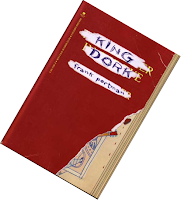
First things first: the epigraph at the top of this page- the one about wishing an author was a "terrific friend of yours"- is the sentiment of one Holden Caulfield, the teenage narrator of
The Catcher in the Rye, by J.D. Salinger. I was reminded of that particular quotation while reading a
blog entry by one of my favorite online writers, Noel Murray of
the A.V. Club. Murray confesses that, upon first reading
Catcher, he, like thousands of disaffected adolescents before and after him (including me), considered Salinger to be this potential terrific friend, until he learned of the author's "prickly reclusiveness" (Salinger has lived the life of a hermit in New Hampshire since the 1951 publication of
Catcher, publishing his last short story in 1965).
In day-to-day life, there's a word for this sense of intimate identification with a person who knows little or nothing of your existence: it's called a crush. I've taken to calling that yearning for a terrific author friend (or, alternately, a terrific fictional character friend) a literary crush or- here it is- a
lit crush. A (by no means exhaustive) list of my past and present lit crushes: J.D. Salinger, Kurt Vonnegut, Flannery O'Connor, Joseph Heller, Alan Moore, Ursula Le Guin, Gabriel García Marquez, John Steinbeck, Jack Kerouac, David Sedaris, J.K. Rowling, William Faulkner, Graham Greene, Miguel de Unamuno, Shushaku Endo, Annie Dillard, Philip Pullman, and Italo Calvino.
During freshman final exams last week, I looked up from my last minute grading to see Carman engrossed in her copy of
The Catcher in the Rye. I smiled, and when I got her attention I think I gave her a thumbs up sign or something. I was so proud. Then, having been reminded of the sophomore accelerated reading list, I pulled
Frank Portman's
King Dork from the top of the stack of reading list books that I'd yet to read. Page twelve made me sink a little in my swivel chair; the narrator, Tom Henderson, called me out- it may as well have been by name.
I should mention that The Catcher in the Rye is this book from the fifties. It is every teacher's favorite book. the main guy is a kind of misfit kid superhero named Holden Caulfield. For teachers, he is the ultimate guy, a real dreamboat. They love him to pieces. They all want to have sex with him, and with the book's author, too, and they'd probably even try to do it with the book itself if they could figure out a way to go about it. It changed their lives when they were young. As kids, they carried it with them everywhere they went. They solemnly resolved that, when they grew up, they would dedicate their lives to spreading The Word.
It's kind of like a cult.
They live for making you read it. When you do read it you can feel them all standing behind you in a semicircle wearing black robes with hoods, holding candles. They're chanting "Holden, Holden, Holden..." And they're looking over your shoulder with these expectant smiles, wishing they were the ones discovering the earth-shattering joys of The Catcher in the Rye for the very first time.
I hung my head in shame, and showed the passage to Carman. But it should be pointed out that Tom's aversion to
Catcher is more than a little ironic- not least because his narrative voice (albeit with updated swear words and more explicit sex and drug references) is nearly identical to that of Holden Caulfield. He wears his influences like a merit badge.

I like
King Dork so far. I've added Portman to my lit crush list. I set up imaginary scenarios where I'm sitting on the BART on my way to the airport (Portman lives in the Bay Area) and an oddly familiar stranger notices that I'm carrying around a battered, broken-spined copy of
King Dork. He introduces himself and asks how I like it. And I tell him that I'm enjoying it so far, especially all the, you know, irony and allusions to canonical coming of age literature- and I mention that I'm a sophomore accelerated English teacher. We laugh about his not-so-sympathetic portrayal of teachers in the book. I tell him that, just like Tom, I count Graham Greene's
Brighton Rock among my favorite novels. He admits that that part of the character was autobiographical. We talk about getting matching
Brighton Rock tattoos.
I tell him about how I was in a band in high school that was heavily influenced by his band,
The Mr. T. Experience, and how I owned all of their records (This is only a white lie: my best friends Chris and Matthew were in a band called Nickel Foods that sounded an awful lot like the pop-punk of MTX; I was in a one-man-band that changed names every week and opened for them at house shows, and sounded more like Woody Guthrie. Chris and Matthew owned all of the MTX albums). He says he'd love to hear my stuff, maybe collaborate on some tunes one day. I say that'd be cool.
These days, I suppose one could perpetuate the fantasy of a literary crush (or musical crush, or cinematic crush) via the magic of myspace ("friend me, famous person!!!"), but I don't bother with that racket. Maybe one day I'll go into a long-winded explanation of the evils of myspace. But for now, this is where I'll talk about what I'm reading over the summer, and hopefully get some feedback from a few of you as you're delving into the list as well. Feel free to comment- particularly if you've got a literary crush of your own.
I've had a request to post the list, so here it is- along with each book's current status within my own attempt at summer reading.
Alvarez, Julia. How the Garcia Girls Lost Their Accents. 1992. I've only read pieces of this one- I imagine I'll get to it later this summer.
Anaya, Rudolfo. Bless Me, Ultima. 1972. Again, not yet. But I'll be in New Mexico, where this one takes place, later this month, so it might be a good thematic read.
Anderson, Laurie Halse. Speak. 1999. I just bought this one, and I've begun reading it while I'm reading King Dork.
Angelou, Maya. I Know Why the Caged Bird Sings. 1969. I'm borrowing my wife's copy for this one. I've only read Maya Angelou's poetry.
Anonymous. Go Ask Alice. 1971. I bought this a long time ago at a used book sale and never got around to reading it. I think it might match up well with Speak, from what I've heard.
Card, Orson Scott. Ender's Game. 1985. This is a re-read. I first discovered it when I was a scifi-obsessed middle schooler.
Chbosky, Steven. The Perks of Being a Wallflower. 1999. I'm buying this one today, if I can find it at the used book store.
Cormier, Robert. The Chocolate War. 1974. This one's a classic I missed out on because I was snobby about the books I chose to read, and refused to pick up anything that was actually aimed at "young adults." I'll look for it today.
Haddon, Mark. The Curious Incident of the Dog in the Night-Time. 2003. I read this a couple of years ago, when everyone was telling me I had to, since I was working with developmentally disabled adults. If I remember correctly, it was a pretty quick read, so I'll pick it up when I'm feeling too exhausted for something longer.
Kidd, Sue Monk. The Secret Life of Bees. 2002. Mrs. Quinn says this one is phenomenal. I haven't gotten to it yet.
Kincaid, Jamaica. Annie John. 1985. I "read" this one in college- which means that I may have missed much of the joy of it because I was too busy trying to craft the perfect English essay out of it.
Knowles, John. A Separate Peace. 1959. Sophomore year, 1993-1994, required reading. I still have trouble spelling separate.
Morrison, Toni. The Bluest Eye. 1970. I've only read Morrison's short stories, but they knock me out.
Myers, Walter Dean. Monster. 1999. Again, haven't read it, but will. Soon.
Peet, Mal. The Keeper. 2003. I started this one, then lent it to a student who never brought it back. Commander Adama on Battlestar Galactica says to never loan a book; it's always a gift. I'll find another copy before summer's over.
Portman, Frank. King Dork. 2006. See blog entry above. I'm almost finished.
Potok, Chaim. The Chosen. 1967. I've read this twice, in high school and college. Classic.
Salinger, J.D. The Catcher in the Rye. 1951. Every teacher's favorite book. I've lost count of the number of times I've re-read it.
Satrapi, Marjane. Persepolis. 2003. I've read this one once, and seen the movie (which is quite faithful). I'll probably read it again and rent the film for fun.
Sebold, Alice. The Lovely Bones. 2002. Looking forward to this one- I've heard only good things.
Wharton, William. Birdy. 1978. My dad got really angry at me for reading this in high school. It holds a special place in my heart just for that.
Happy reading, and come back soon.



















